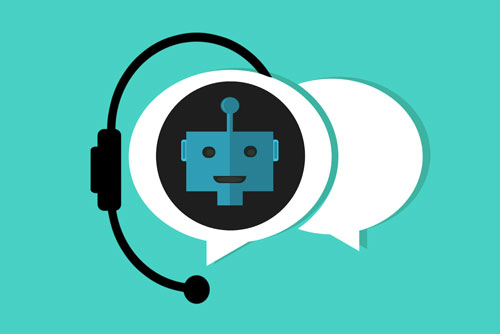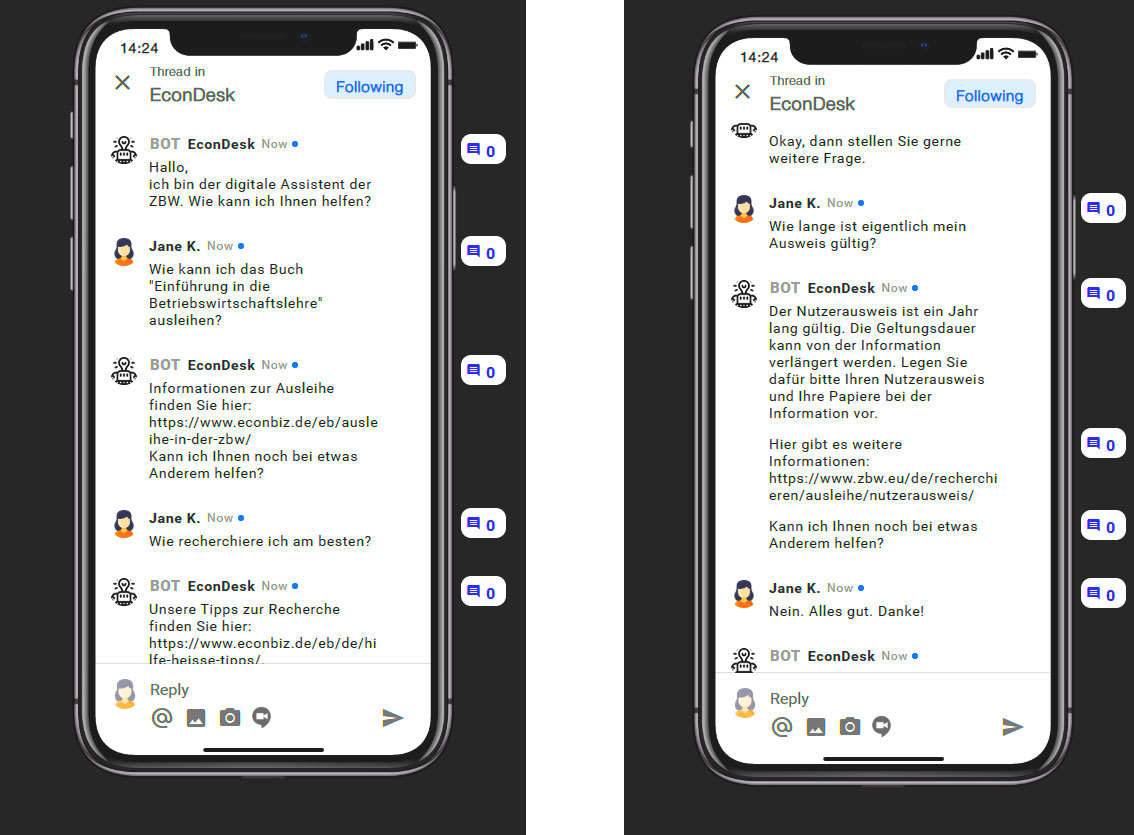
Hackathon Coding.Waterkant: How to Improve Library Services Through Chatbots and Artificial Intelligence
“Hackathons” have been around for several years now in the world of libraries. They are events at which tech-savvy people meet to work on software solutions for set problems (challenges) within a set period of time, for example 48 hours. People usually work together in cross-functional teams.
by Anastasia Kazakova and Olaf Siegert
Since 2016, the Digital Economy Schleswig-Holstein (DiWiSH), which is funded by the state government of Schleswig-Holstein, and the non-profit initiative opencampus.sh have been organizing the Waterkant.Festival every year in Kiel. This year’s event had to take place virtually due to corona. For the first, time this year there was as a kickoff the Coding.Waterkant Hackathon which took place in cooperation with Kiel.AI.

The ZBW – Leibniz Information Centre for Economics was actively involved in the 2020 hackathon and oversaw two self-formulated challenges. The focus was on innovations relating to two of our main products: EconStor an Open Access repository, and EconBiz, the specialist research portal for economics.
In the following, the two ZBW teams report briefly on their experiences at the Coding.Waterkant Hackathon:
The EconStor Challenge: The subsequent enrichment of metadata for full texts
The EconStor Challenge tackled the problem that some information which could be interesting from the user’s perspective – for example research data on which a research paper is based or the research funding provider – is mentioned in the text, but is not displayed in the bibliographic data that is usually provided by libraries (metadata). So far, it has not been possible to search for it in EconStor, nor has it been possible to filter a specific selection of metadata accordingly (for example, using a faceted search or a drill-down menu). This would require the information to be prepared first.
Since the subsequent preparation of metadata for the approximately 200,000 EconStor full texts would likely entail a great deal of manual work, this preparation was to be largely automated using software technology – in this case using new artificial intelligence or machine learning approaches. The AI algorithm used is trained to recognise certain patterns that keep appearing in the context of the information searched in academic texts in order to further refine accuracy when it comes to finding this data.
Using a pilot sample of around 7,000 EconStor documents, two hackathon participants developed a database which can be used to specifically search for this information. The EconStor team was very impressed with the results of the prototype developed during this short period of time and is now trying to further improve the results together with the developers. If a hit rate is achieved that is acceptable to those in charge of EconStor, the aim is to integrate this technology into the open access repository.
The EconBiz Challenge: Developing a Chatbot
The EconBiz team gave the hackathon teams approximately 4,000 anonymised chat transcripts and challenged them to develop a library chatbot. This was intended to help the EconDesk colleagues. EconDesk is ZBW’s online information point for the economic sciences. The EconBiz team was not expecting to get a completely finished chatbot that they could add directly into the productive system. The aim was rather to try out something new with others and test and expand the boundaries of technology.
The hackathon team for the EconBiz chatbot consisted of three participants and two “godmothers”. The first step was to outline the framework for the prototype, prepare data and set up a development environment using Rasa X. Rasa X is a tool that facilitates the development of an AI assistant. It soon became clear that the transcripts had to be prepared more intensely for the chatbot to be able to learn properly. The second finding: Without the library colleagues, there couldn’t really be any progress.

This is because it turned out that it was not enough to provide the transcripts to the Rasa-X script. The questions from the transcripts had to be clustered and suitable answers had to be found. Thanks to the support of the library colleagues, the EconBiz team had a set of intents at the end of the first day, which was further refined on day 2. “Intents” are the user intentions to which a chatbot then reacts. The next step was to train the chatbot until it could be finally demonstrated in the afternoon of the second day.

As predicted, the EconBiz chatbot was not perfect. But it knew the correct answer to the North German “Moin!” (meaning “hello”, “how are you” and “good-bye”), and also the library’s opening hours. The EconBiz team learnt a lot from this challenge and had a lot of fun. It was fascinating to see how strangers worked together towards one goal; how they supported each other and shared their knowledge. You felt reminded of your own student days.
Conclusion for Coding.Waterkant Hackathon
Looking back at the two ZBW challenges at the Coding.Waterkant Hackathon the EconStor and EconBiz teams take the following, though not surprising, findings: data is important and an interdisciplinary team essential. Both teams will continue to monitor the implementation of the hackathon’s results and also to pursue topics of innovation and AI. However, there’s something that also became clear: In addition to the possibilities associated with artificial intelligence, there are also limits and dangers. Perhaps the ZBW should host a hackathon itself? One for librarians, of course, …
The results of the Coding.Waterkant Hackathon have been published on Devpost, a platform for hackathons.
This might also interest you:
- Hackathon in a library: How do I organise my first Hackathon successfully? (German)
- Waterkant Festival 2019: a Blueprint for a Lived Culture of Innovation
- Waterkant Festival 2018: A model for learning and working 4.0
- Waterkant Festival 2017: Augmented Reality, Educational Hacks and Coworking
- Coding Da Vinci 2018: Hackathon on Open Date from Research and Cultural Heritage Institutions
About the authors:
Anastasia Kazakova is a research assistant for research-based innovation and development for EconBiz at the ZBW.
Olaf Siegert is head of the Publication Services department and Open Access Representative of the ZBW – Leibniz Information Centre for Economics. He is involved with open access as part of his work at the ZBW and is also active for the Leibniz Association, where he represents the Leibniz Open Access working group in external committees. He is involved in the Alliance of Science Organisations in the working group Scientific Publication System and at Science Europe for the Leibniz Association.
Chatbot-Mockup was made with Botsociety and Flaticon.
View Comments

Libraries and Online Events, Part 3: How Online Workshops Encourage New Ideas and Collaboration
It isn’t just conferences, trade fairs and other events for substantive dialogue that...



